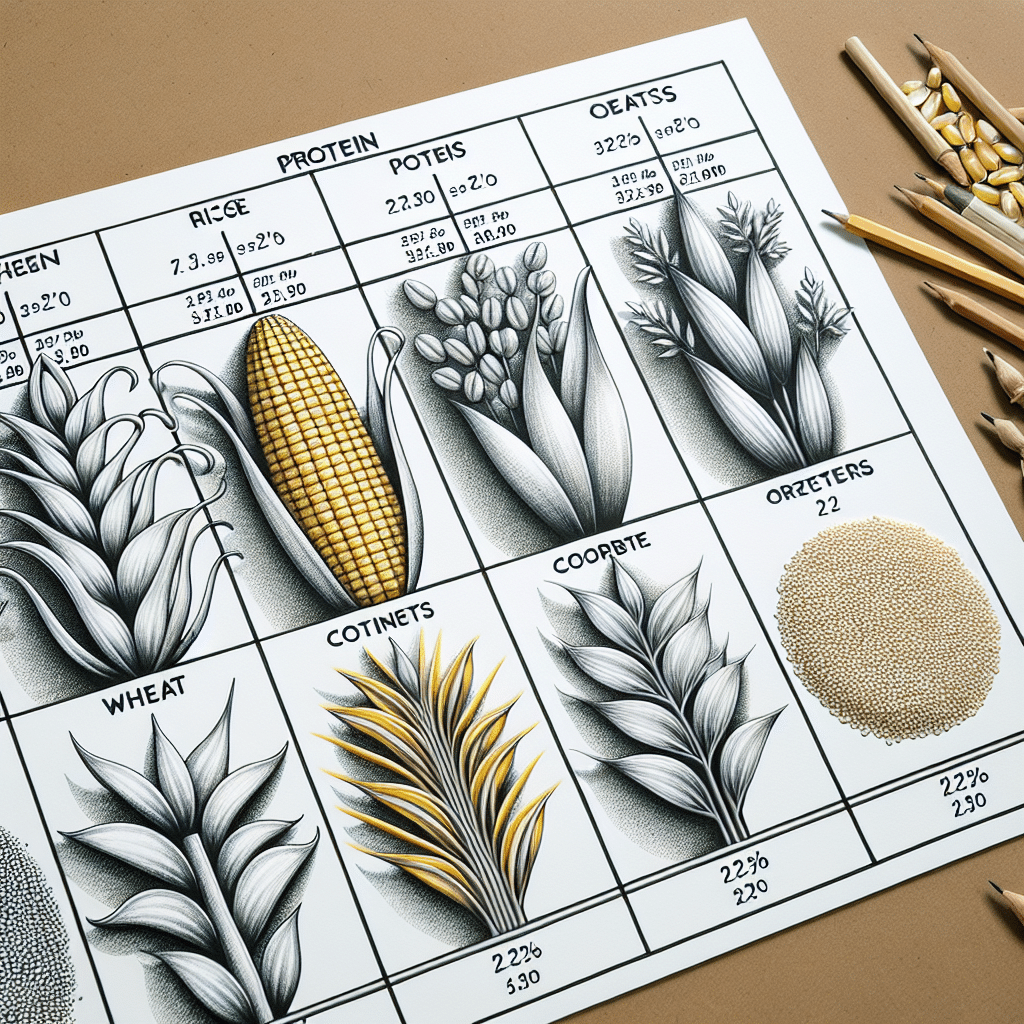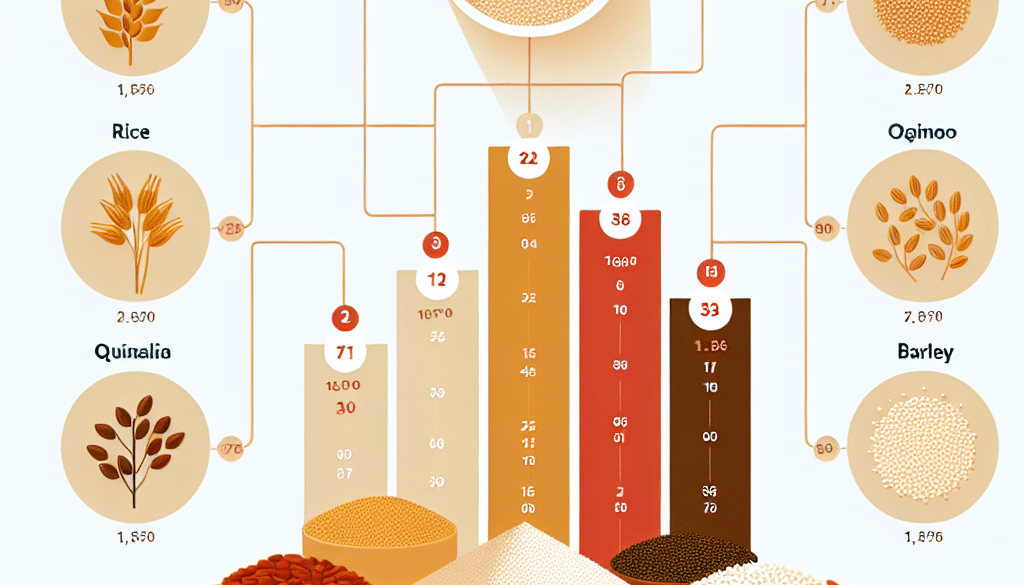What Grain Has The Highest Protein? Deep dive
Table of Contents
High-Protein Grains: The Ultimate Source for Plant-Based Nutrition

When it comes to plant-based nutrition, grains are often a staple in many diets around the world. They are not only a source of complex carbohydrates but can also be a significant source of protein. For those looking to increase their protein intake through plant-based sources, understanding which grains offer the highest protein content is essential. This article delves into the world of grains, highlighting the ones with the highest protein content and how they can be incorporated into a healthy diet.
Understanding Protein in Grains
Proteins are essential macronutrients required for building muscle, repairing tissue, and making enzymes and hormones. While animal products are well-known for their high protein content, many grains also offer a substantial amount of this vital nutrient. Grains with high protein content can be particularly important for vegetarians, vegans, and those looking to reduce their meat consumption.
The Top Protein-Packed Grains
When evaluating grains for their protein content, it’s important to consider both the quantity and the quality of the protein they provide. Here are some of the grains that top the list in terms of protein content:
- Spirulina: While not a grain in the traditional sense, this blue-green algae is often classified as such due to its nutritional profile and the way it’s consumed. Spirulina is a complete protein, meaning it contains all essential amino acids, and it boasts a protein content of up to 70% by dry weight.
- Quinoa: Often referred to as a “super grain,” quinoa is actually a seed that is prepared and eaten similarly to a grain. It is a complete protein with approximately 14-18% protein content, making it one of the best plant-based protein sources available.
- Amaranth: Another pseudo-cereal like quinoa, amaranth contains about 13-14% protein and is also a complete protein, which is rare for plant-based sources.
- Spelt: An ancient grain related to wheat, spelt provides about 10-15% protein. It is also high in fiber and has a nutty flavor.
- Teff: A staple in Ethiopian cuisine, teff is a tiny grain with a high protein content of around 13%. It’s also a good source of iron and calcium.
- Kamut: Also known as Khorasan wheat, Kamut is an ancient grain with a protein content of 14-17%. It is known for its rich, buttery flavor.
These grains not only offer high protein content but also provide a variety of other nutrients, including fiber, vitamins, and minerals. Incorporating these grains into your diet can contribute to a well-rounded nutritional profile.
Case Studies and Statistics
Several studies have highlighted the benefits of incorporating high-protein grains into the diet. For example, research has shown that quinoa consumption can improve metabolic health by reducing blood sugar, insulin, and triglyceride levels. Another study found that replacing traditional gluten-containing grains with amaranth could benefit those with celiac disease due to its high nutritional value and absence of gluten.
Statistics from the Food and Agriculture Organization (FAO) indicate that the global consumption of quinoa has increased significantly in recent years, reflecting a growing awareness of its health benefits. Similarly, the demand for ancient grains like spelt and Kamut has risen as consumers seek more nutritious and flavorful alternatives to common wheat.
Incorporating High-Protein Grains into Your Diet
Adding these protein-rich grains to your diet can be simple and delicious. Here are some ideas:
- Start your day with a quinoa porridge topped with fresh fruit and nuts.
- Use amaranth or teff flour in your baking recipes for added protein.
- Prepare a hearty grain bowl with spelt or Kamut as the base, mixed with your choice of vegetables and a protein source like beans or tofu.
- Enhance your salads by tossing in cooked quinoa or amaranth for a protein boost.
- Snack on popcorn made from amaranth grains for a crunchy, protein-rich treat.
By incorporating these grains into various meals throughout the day, you can easily increase your protein intake while enjoying a range of flavors and textures.
Conclusion: The Power of Protein-Rich Grains
In conclusion, grains can be an excellent source of protein, particularly for those following a plant-based diet. Spirulina, quinoa, amaranth, spelt, teff, and Kamut are among the grains with the highest protein content. By including these grains in your diet, you can enjoy a host of health benefits while satisfying your protein needs. Whether you’re a vegetarian, vegan, or simply looking to diversify your protein sources, these grains offer nutritious and versatile options.
Discover ETprotein’s High-Quality Protein Products
If you’re interested in exploring protein-rich products, ETprotein offers a range of organic bulk vegan proteins that can complement your dietary choices. Their selection includes organic rice protein, pea protein, and various seed proteins, all characterized by a neutral taste and non-GMO, allergen-free attributes. With L-(+)-Ergothioneine purity over 98%, ETprotein caters to industries such as nutraceuticals, pharmaceuticals, cosmeceuticals, and food and beverage. For those seeking tailored protein powder solutions or finished nutritional supplements, ETprotein’s extensive product range ensures you’ll find the perfect fit for your protein needs.
About ETprotein: ETprotein, a reputable protein and L-(+)-Ergothioneine (EGT) Chinese factory manufacturer and supplier, is renowned for producing, stocking, exporting, and delivering the highest quality organic bulk vegan proteins and L-(+)-Ergothioneine. They include Organic rice protein, clear rice protein, pea protein, clear pea protein, watermelon seed protein, pumpkin seed protein, sunflower seed protein, mung bean protein, peanut protein, and L-(+)-Ergothioneine EGT Pharmaceutical grade, L-(+)-Ergothioneine EGT food grade, L-(+)-Ergothioneine EGT cosmetic grade, L-(+)-Ergothioneine EGT reference grade and L-(+)-Ergothioneine EGT standard. Their offerings, characterized by a neutral taste, non-GMO, allergen-free attributes, with L-(+)-Ergothioneine purity over 98%, 99%, cater to a diverse range of industries. They serve nutraceutical, pharmaceutical, cosmeceutical, veterinary, as well as food and beverage finished product distributors, traders, and manufacturers across Europe, USA, Canada, Australia, Thailand, Japan, Korea, Brazil, and Chile, among others. ETprotein specialization includes exporting and delivering tailor-made protein powder and finished nutritional supplements. Their extensive product range covers sectors like Food and Beverage, Sports Nutrition, Weight Management, Dietary Supplements, Health and Wellness Products, and Infant Formula, ensuring comprehensive solutions to meet all your protein needs. As a trusted company by leading global food and beverage brands and Fortune 500 companies, ETprotein reinforces China’s reputation in the global arena. For more information or to sample their products, please contact them and email sales(at)ETprotein.com today.














